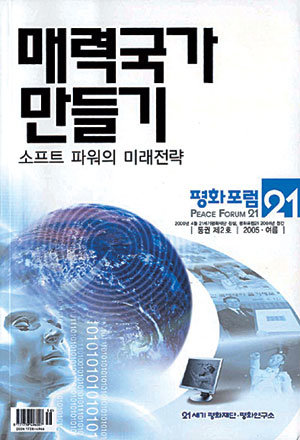Defining Koreas Growth as a Function of Merit and Charm
Defining Koreas Growth as a Function of Merit and Charm
Posted August. 20, 2005 03:04,

The dictionary defines maeryeok (charm) as an entrancing power. In Chinese, mae means to captivate. The exact definition of this literary expression is hard to pinpoint.
The nine authors of this book, who are majoring in political diplomacy, economics, and the social sciences, are striving to establish this liberal expression into one on par with Koreas future national strategy. It is an attempt to creatively apply Harvard University professor Joseph Nyes international political definition, which defines hard power as a nations military and economic power, and soft power as the emotions, cultures, and morals of a nation, to Koreas reality.
The soft power theory is based on the worlds hierarchy strategy. So it follows that it cannot immediately be applied to the Korean strategy. To avoid this, the writers have substituted hard power with merit, and soft power with charm. The two definitions are both contrastive and complementary. Charm without merit is void, whereas merit without charm is bland.
The writers are focusing on discovering the conditions of charm to effectively exhibit the basis of merit. Some of the examples given are the Korean wave and IT Korea. What are the reasons for Korea being considered as the fueling power behind the Asian market for popular culture, and as an information technology superpower?
One analysis says that the energy reserve of the Korean wave lies in Koreas emotions, dynamic citizenry, and fertile cultural prototype. The IT Korea legend is said to be the result of the coordinated network between the government and businesses, called the National Innovation System (NIS), and the unique marketing strategy of Korean businesses that created emotional products. Here, allure, a component of charm that attracts and caresses, and intellectual capacity, which appeals to logic, are derived.
The analysis of neighboring countries like the U.S., Japan, and China, are also insightful. The U.S. lacks the charm that supports superpowers, and Japan is not having success in its efforts to become a charming nation. The merit of China does not suffice, but the fact that it is not Western, not wealthy, and not exactly powerful yet not weak makes it a country of odd charm.
Chae-Hyun Kwon confetti@donga.com
Headline News
- Joint investigation headquarters asks Yoon to appear at the investigation office
- KDIC colonel: Cable ties and hoods to control NEC staff were prepared
- Results of real estate development diverged by accessibility to Gangnam
- New budget proposal reflecting Trump’s demand rejected
- Son Heung-min scores winning corner kick







